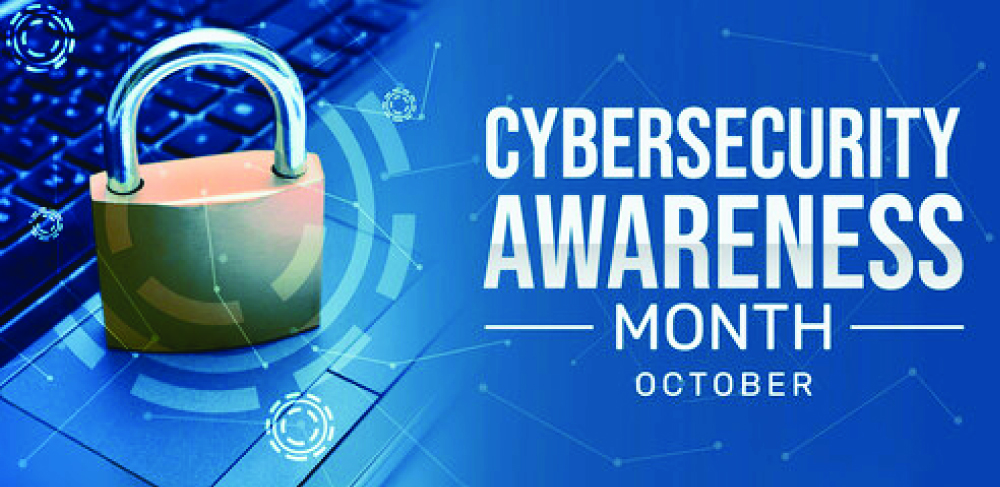October is Cybersecurity Awareness Month, an annual campaign to raise awareness about cybersecurity’s importance and promote best practices for staying safe online. In today’s digital world, where technology is an integral part of our everyday lives, educating ourselves and protecting our personal information and devices from cyber threats has become crucial.
With the rapid advancement of technology, cybercriminals are constantly finding new ways to exploit vulnerabilities and infiltrate our digital lives. The risks associated with cyber threats are more significant than ever, from phishing scams and malware attacks to identity theft and data breaches. Cybersecurity Awareness Month reminds individuals, businesses, and organizations to take stock of their cybersecurity practices and adopt proactive measures to safeguard against potential threats.
One of the main goals of Cybersecurity Awareness Month is to encourage individuals to become more informed about the risks they face and take appropriate actions to protect themselves. This can be achieved by educating oneself about common cyber threats and understanding the best practices for safe online behavior. Some key areas to focus on include:
- Strong Passwords: Creating unique and complex passwords for all your online accounts and updating them regularly is a fundamental step in protecting your personal information.
- Phishing Awareness: Being cautious of suspicious emails, messages, or calls that ask for personal information or financial details is crucial in preventing phishing attacks.
- Software Updates: Keeping your operating systems, antivirus software, and other applications up to date ensures you have the latest security patches and protection against emerging threats.
- Two-Factor Authentication: Enabling two-factor authentication adds an extra layer of security by requiring a second verification form, such as a fingerprint or a unique code sent to your mobile device, to access your accounts.
- Safe Browsing Habits: Avoiding clicking on suspicious links, downloading files from unknown sources, or visiting insecure websites can significantly reduce the risk of falling victim to malware or other cyber attacks.
- Secure Wi-Fi Networks: Using secure and encrypted Wi-Fi networks, especially when accessing sensitive information or making online transactions, is essential for protecting your data from being intercepted by hackers.
- Data Backup: Regularly backing up essential files and data ensures that you can recover them in case of a ransomware attack, hardware failure or data loss.
In addition to individual actions, Cybersecurity Awareness Month emphasizes collective responsibility’s importance in creating a safer digital environment. Businesses and organizations play a critical role in protecting their customers’ data. They should prioritize cybersecurity measures, such as implementing robust security systems, training employees on safe online practices and regularly conducting security audits.
Governments and regulatory bodies also have a role in creating and implementing cybersecurity policies and regulations that protect citizens’ personal information and hold cybercriminals accountable for their actions.
By actively participating in Cybersecurity Awareness Month, individuals, businesses and organizations can contribute to the collective effort to create a secure and resilient digital landscape. Remember, cybersecurity is not just a one-time practice but an ongoing commitment to stay informed, vigilant and prepared in the face of emerging threats.
NC State University Industry Expansion Solutions (IES) offers a Cybersecurity Awareness Toolkit. This toolkit features video lectures from Industry Expansion Solutions, the NC Manufacturing Extension Partnership, the NC Military Business Center, and the Laboratory of Analytic Sciences at NC State University. These videos and additional resources provide you with an understanding of compliance requirements, risk and potential impact on business should you encounter viruses, ransomware, breaches and other cyber attacks.
Cybersecurity tools are provided to assist in moving forward toward compliance. The toolkit also provides multiple training materials to share with your employees.
Recommended For:
This toolkit is designed for businesses with prime and subprime contracts with the Department of Defense. In addition, small and medium-sized businesses and anyone that is interested in learning more about cybersecurity.
Availability:
This toolkit is available online, 24/7
Participants Will:
- Develop a foundational awareness regarding the cyber risks associated with your business.
- Identify the cybersecurity requirements for all Department of Defense sub and prime contractors.
- Access tools you can use immediately to track and plan for your compliance efforts.
- Access cybersecurity awareness training materials for your employee awareness and training campaigns including animated videos, flyers and pocket cards.
Topics Include:
- Cybersecurity 101: An Introduction
- Employee Education and Training
- Incident Response
- Risk Management
- DFARS and NIST 800-171 Requirements
- Moving Toward Compliance












